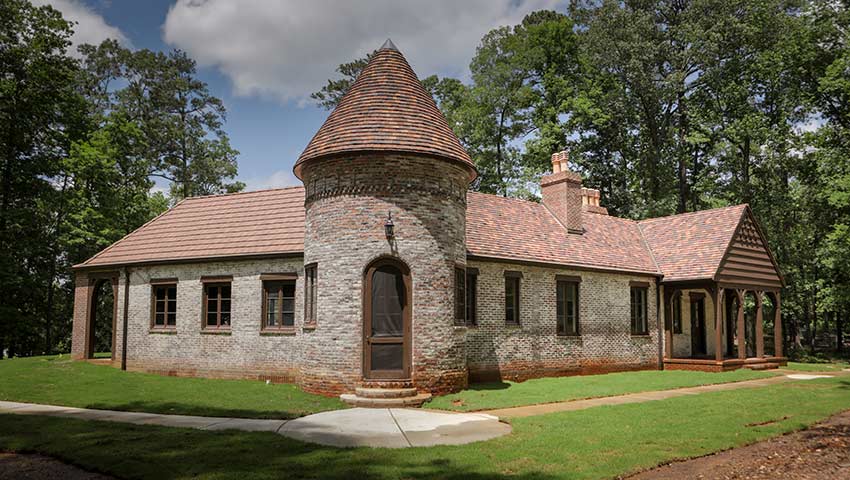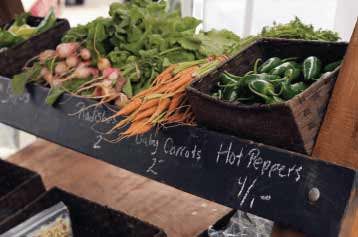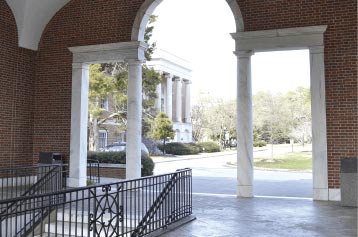
In 1928, cotton was king and James Hyde Porter was the king of cotton. Just fifty-two years earlier, Mr. Porter’s father, Oliver S. Porter, helped to establish the Bibb Manufacturing Company in Macon, Georgia. In little more than half a century, the enterprise grew to become the largest cotton and textile company in the world, an industrial powerhouse with vast holdings including the 750,000-square-foot Columbus Mill on the Chattahoochee River at the border of Georgia and Alabama. As the company grew, so did James Hyde Porter’s business and economic influence. At the close of the 1920s, Mr. Porter was one of Georgia’s wealthiest and most influential citizens.
But despite his skill as a businessman and industrialist, James Hyde Porter is better remembered for something else: generosity. Throughout his life, Mr. Porter invested in the communities where his business interests were located, supporting schools, churches, community centers, and healthcare clinics. Commemorating the influence Mr. Porter had on the institutions they house, scores of buildings across Georgia and the South bear the Porter name.
Wesleyan, too, benefitted from Mr. Porter’s philanthropic spirit. He joined Wesleyan’s board of trustees just before the College began construction of its campus on Forsyth Road. During his tenure as a trustee, James Hyde Porter was deeply involved in the life of the College, using his business connections to advocate for her mission, hosting entire classes of students in his home for picnics and parties, and challenging others to match his efforts to strengthen Wesleyan’s financial position. Dr. Silas Johnson, former president of Wesleyan College, remembered Mr. Porter as, “the most unselfish man I have ever known.” In 1949, The Wesleyan Alumnae magazine described him as “Wesleyan’s most generous benefactor” and “one of the biggest-hearted men to ever live.”
Mr. Porter’s support for Wesleyan College continues even now, nearly sixty-five years after his death. The James Hyde Porter Charitable Trust regularly makes gifts to the College to maintain, repair, and modernize the buildings on Wesleyan’s campus that are named for members of the Porter Family. In recent years, gifts from the Trust have funded significant repairs to Porter Gymnasium and the complete replacement of the roof on the Porter Family Fine Arts building.
In April of 2013, the College’s relationship with the James Hyde Porter Charitable Trust took a new turn. Partnering with the Historic Macon Foundation, the Porter Charitable Trust provided funds to relocate Porterfield, James Hyde Porter’s country home, to Wesleyan College’s campus and to restore the building to useful condition. The French-Tudor inspired house, built the same year as Wesleyan’s Forsyth Road campus, was designed by W. Elliot Dunwody, a prominent Macon architect. Mr. Dunwody also designed several buildings on the College’s campus, including the Porter Family Fine Arts Building, Huckabee Hall, the Jones and Hightower residence halls, the Murphey Art Building, and the Willet Library. Speaking of the architectural significance of Porterfield, Josh Rogers, then executive director of The Historic Macon Foundation said, “The Porter House is unique in all of Middle Georgia and is one of W. Elliott Dunwody’s most unusual and attractive commissions.” Once the move and restoration are complete, Wesleyan intends to use the house as guest quarters and as a small event space. The building will be located near the campus gate on Tucker Road.
Originally, Porterfield served James Hyde Porter and his family as a country home and a private retreat. The property, which was located just off Georgia Highway 41 in South Bibb County, featured elaborate rose gardens, a smokehouse, a barn, several outbuildings, and one of the first swimming pools in the area. Mr. Dunwody’s design for the home incorporated elaborate timbering, whitewashed brick, custom joinery, and an unusual clay tile roof. At Mr. Porter’s death in 1949, the house and grounds were willed to the Porterfield Baptist Church. The congregation cared for the home until it was donated to the College in 2013. At a recent meeting of the congregation, members fondly recounted Mr. Porter’s influence on the community and expressed their gratitude to the James Hyde Porter Charitable Trust for making the restoration of the house possible saying, “many of us learned to swim in Mr. Porter’s swimming pool and a fair number of us were baptized there too.”
When The Wesleyan Alumnae magazine announced Mr. Porter’s death in 1949, the editors included a story about Porterfield. It reads:
Only a few weeks before his death, when he was in the hospital, [Mr. Porter] said to Wesleyan’s president about the barbeque with which the senior class is accustomed to being entertained at Porterfield, his country place: “Do not change your plans. If I am able, I shall be there, and if I am not, I shall think of the girls being there and be happier.”

Wesleyan College is privileged to steward many arts and cultural events and share them with the community. Most are free and open to the public. Wesleyan art galleries are open M-F 1-5PM and on Wesleyan Market Saturdays from 10AM-2PM.
Event listing
Tour our beautiful 200-acre campus featuring Georgian architecture, lush green spaces, recreational facilities, residence halls, and worship center.
Vist Wesleyan Virtually
Wesleyan College is home to five NCAA Division III sports: soccer, basketball, volleyball, tennis, and softball. In addition, we offer an award-winning Intercollegiate Horse Show Association (IHSA) Equestrian program.
View More